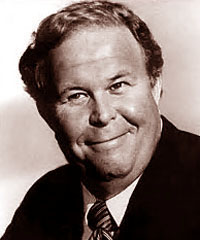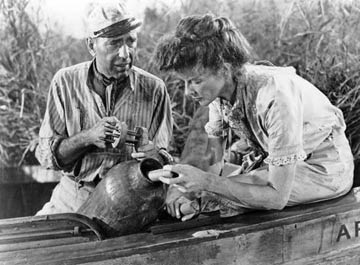« May 01, 2011 - May 07, 2011 | Main | May 15, 2011 - May 21, 2011 »
May 13, 2011
Club Ned Evening Wear: Overheard in Palisades.
"Honey, just wear a black turtleneck--even Ned Beatty looks good in a black turtleneck."

Club Ned: Beatty looks happy and relaxed just days before his first Georgia fishing float-trip to bond with buddies and nature and ending in the small but brain-damaged village of Antry. Seriously, Louisville-born Beatty, 73, is one of America's great talents. Actor's actor. Played a fine Tennessee lawyer in Robert Altman's rule-breaking, genre-crashing "Nashville".
Posted by Holden Oliver (Kitzbühel Desk) at 11:59 PM | Comments (0)
Friday the 13th: Did You Have a Bad Week?
In old Rome, witches gathered in groups of 12--and a 13th was believed to be the devil. There's also a Norse gods spin on that one. The ancient world also liked executions to take place on Friday. All three are just a tiny sliver of the lore and legend on why Friday the 13th is unlucky in many cultures.
Well, in fact, I did have a bad week.
My co-writer and boss (who really does have a firm employee ID# of 666) was moodier than usual. I ran out of my good Irish whiskey here in the Tyrol by Thursday. Our 2 small children have the flu. And by mistake I threw away a Berlin waitress's phone number on the napkin she gave me. I had no intention of calling the number; however, my wife somehow found the napkin and cross-examined me on it. Expertly. And with feeling.
Today is Friday the 13th. I will not do anything but work. Promise.
.jpg)
Posted by Holden Oliver (Kitzbühel Desk) at 11:13 PM | Comments (0)
An incomplete person. A negligent citizen. And a drag to have around.
Is the client rep or GC you're going to lunch with a Marshall or Fulbright scholar? Well, do not drag people under 30 along. They think Flaubert is a food, Marx a chain of movie theaters, and Disraeli my second favorite Cream album.
As "bright" and "educated" as they are, the vast majority of the younger hires (Slackoisie, Gen Y, Gen X, Echo Boomers, Looters or whatever we are calling them this week) I've met, known, worked with, or worked against in the last decade--in my firm's shops or in other workplaces--are at best semi-literate. And, yes, semi-literate, the more I think about it, is going a bit too far.
They don't know anything about "The World So Far".
It is not their fault, maybe. I don't care how they got this way. We don't need to probe for reasons or cast blame.
These people just need to change. But me? Nope. I don't need to change to accommodate "them"--any more than I "need" (a) a lobotomy, (b) to watch any reality TV, or (c) to snort solvents and cleaning products.

Newsweek/F. Martin Rami
Put another way, if a toddler climbs up and takes a Big Messy Dump on your dining room table during Easter dinner just before Uncle Harold dips into his pudding, it is not "just different" and therefore deserving of any respect and accommodation. It's also Just Wrong, dude.
White Collar Professional Ignorance--accompanied by Cookie-Cutter Thinking and Cultural Illiteracy--is a progressing American disease. The illness may touch 99 of out 100 new law hires.
Again, I do not need to change. Uncle Harold does not need to change. Neither do the other grossed-out diners.
White Collar Gen Y, in particular, is dumping all over America. The smarter and bolder Slackoisie ones will "change" just to keep up--just as I once needed to re-learn two foreign languages, needed to pass the California bar exam twenty years out of law school, or needed to change my life on a couple of occasions due to my enthusiasms for Scotch and Other People's Womenfolk. But I cannot do it for them.

How do they get "there"? I really don't care how. But it's certainly all out there in front of them. Even if you are young, and are part of the new batch that was never taught to think or lead on its own, you can at least find the tools.
This is America in 2011, Jack. We don't ban books. And you are allowed here to talk about what you learn. Or to disagree with what you've read or heard. Our best educational resources (like books) are mainly either free or cheap.
The ideas: Democracy. What were the Greeks, or Martin Luther, thinking about, anyway? Why do people still talk about them? The world's long transition from an agricultural to industrial economy. Regulating industries. Well, should we? And how much? What did Ralph Nader do? What are the responsibilities (or not) of developed nations' governments. What are the Chinese doing off and on throughout history when no one is looking? The institution of the family has served humans very well. But does marriage make sense anymore? And, just for fun, why is Keith Richards still alive?
Church versus State. You've heard of that one. And the place of organized religion in a world where people who know better will kill--or at least remain very small-minded for their entire life--to support a set of ostensibly harmless and even common sense ideas of an insular Christian or Muslim sect.
What are the Great Books, anyway? How did they change things? If you're a corporate lawyer, do you really need to know anything about a dead guy named Sinclair Lewis?
In the U.S., you can talk to people about these ideas, developments, works, innovators, and authors. You can argue. Recreate the old arguments. Make brand new ones. Whether or not they are established concepts, or institutions, you can challenge them--and have 99.75% odds that no one will throw you in jail. But you need to get the "vocabulary".
Sorry to get "old" on you--but lots of people fought and died all over the world for centuries so you (especially if you're an American) could learn and do all this stuff. And very recently.
We were hoping you'd be a citizen of the world, and maybe be poised to lead a bit, and to do that you need to know something about the history of your new "small" world, this country (Americans tend to isolate themselves so you have to reach way out), and the ideas and events that got everyone this far without literally blowing it all up.
About 30 centuries is what you need to catch up on. The world itself, like America, is actually pretty young. Lots of smart people--both dead and still living--have outlined and distilled a lot of what's happened so far for you. Please find their work. Maybe you can even get started with your favorite search engine.
But I cannot teach anyone on this Earth--or where I work--to have self-respect. Or to appreciate at once both the career value and more critical "quality-of-life" value of an education. Or to prize attaining the hard-won state of "being well-rounded".
I can forget about the expense in hires that do not work out. We'll take that hit. It's always worth it to try. Down through the ages, humans--especially those forged in pain, trauma or struggle--are generally and consistently amazing; they are always worth a gamble. But what comes into my world over and over again in recent years are hardly the Renaissance men and women many people expect of lawyers and young professionals. It's getting worse. No pain, trauma or struggle, of course--all of which could have helped them. No gospel, no gumption, no soul, and no education at all. No book-learning. Or even character-developing.
They are embarrassing, lacking both the vocabulary and bare-bones knowledge of the main threads of Western culture. It's as if they speak "digital" but do not care to learn and speak English. I experienced this last week, and the week before; it will come my way again this week.
Is the GC you're going to lunch with a Marshall, Fulbright or a Rhodes scholar? Do not drag people under 30 along. They think Flaubert is food, Marx a chain of movie theaters, and Disraeli my second favorite Cream album (after "Wheels of Fire").
And knowing these things is more than a social grace. Lawyers analyze and construct arguments. Reading or using, for instance, a legislative history for a bill in Congress or before a state legislature may require background in the American political process and its history, knowledge of past and current American public policy debate, and even appreciation of English and much older (i.e., Roman, Greek, tribal) ideas, traditions, methods and practices. Some examples of the latter are split-sampling in environmental law (English), the notion of popularly electing judges (German tribal and mid-19th century U.S.) and the notion of arbitration (the Ancient World).
Other lawyers and clients--not all, but many--expect younger people to have such knowledge and instincts. Like me.
If you know of any "mutant" exceptions to the syndrome--young lawyers, paralegals, researchers, assistants (I expect everyone in the legal profession to have modicum of cultural sophistication or at least be stretching that way)--have them e-mail me or reach me through the comments (which we won't publish).
Finally, the last chapter--Chapter 6, entitled "No More Culture Warriors"--of The Dumbest Generation (2009), the best-seller by Emory English professor Mark Bauerlein, is the most moving 31 pages I have read about why being steeped in the older and enduring ideas, events and works of the last 2500 years--especially the last 250 years of the American experiment--is required and minimum stuff for educated young people to have deep in their bones, minds and souls.
And so they will never embarrass you at lunch.
I don't agree with everything in Bauerlein's book, but would still have been proud to have written much of it. See these excerpts from Chapter 6:
[I]f you ignore the traditions that ground and ennoble our society, you are an incomplete person and a negligent citizen.
It isn’t funny anymore. The dumbest generation cares little for history books, civic principles, foreign affairs, comparative religions, and serious media and art, and it knows less.
Careening through their formative years, they don’t catch the knowledge bug, and tradition might as well be a foreign word. Other things monopolize their attention—the allure of screen, peer absorption, career goals.
They are latter-day Rip Van Winkles, sleeping through the movements of the culture and events of history, preferring the company of peers to great books and powerful ideas and momentous happenings. From their ranks will emerge few minds knowledgeable and interested enough to study, explain, and dispute the place and meaning of our nation.
(First appeared April 5, 2010)
Posted by JD Hull at 12:46 AM | Comments (0)
May 12, 2011
Challenges, twists, prima donnas--and hard work.
I should never have switched from Scotch to Martinis. --Humphrey Bogart
You think life in law and business is hard? What if all your partners were grandiose, spoiled, drunk, or poised to shoot a wild animal every morning before work? Okay, you say it's a lot like that now. Well, making John Huston's The African Queen was no summer picnic, either. To get a better idea of the kind of talent and guts it takes to make it as a writer or producer in Hollywood, visit Neely Swanson's No Meaner Place: Hollywood writing, ups, downs, more downs, productions, persistence and dreams.

(updated from April 24, 2010 post)
Posted by Holden Oliver (Kitzbühel Desk) at 11:59 PM | Comments (0)
May 11, 2011
Redux - Prof. Bruce Antkowiak: "Why Law Schools Must Reform".
Law firms cannot be expected to do 95% of the work of lawyer-building. In that regime, clients suffer the most.
The U.S. Law Degree: As immediately useful as "a Ph.d in Poetry"? Bruce Antkowiak, a storied Pennsylvania defense trial lawyer, ex-DOJ section chief and 1977 Harvard Law grad, is now a full-time law professor at Duquesne University. This op-ed piece, "Law Schools Must Reform", appeared in the January 4, 2011 Pittsburgh-Post Gazette. Antkowiak's article is subtitled: "They need to leave the ivory tower--and teach practical lawyering."
Antkowiak's piece is at once both an important call to arms and, frankly, a modest proposal. In addition to making law firms truly efficient, could we ask law schools to perform even minimally and produce something of value? I.e., What are you folks really accomplishing in those 3 years, anyway? We practitioners don't get it. You are making things not only frustrating--but very very expensive. Clients suffer the most.
Can you help even a little? Step up? Firms will train. But we cannot be expected to do 95% of the work of lawyer-building.
Question: What can schools do to prepare students for the day-to-day world of work and commerce?
Excerpts from Antkowiak:
You would think that law schools would make fundamental changes to their programs in the wake of the job crisis, fearing that law degrees might someday be assessed like a Ph.D. in poetry -- soul-satisfying but potentially impractical. A few have responded dramatically, but most have held fast to the traditional law school model or made superficial changes. Why the resistance?
For many law schools, their institutional identity dictates that they be largely disconnected from the practice of law. This is done (I suppose) in the belief that we "in the academy" will thereby establish ourselves as an intellectual elite worthy of praise for the intricacy of our philosophical analysis.
The crisis in the law job market has not occurred because the world has miraculously become such an inherently just place that lawyers are no longer needed. The cries for justice remain as loud as ever. You can hear them no matter how high your ivory tower may rise.
.jpg)
New Siwash Law Grad: Do Law Schools Keep Getting It Wrong?
Posted by Holden Oliver (Kitzbühel Desk) at 12:22 AM | Comments (0)